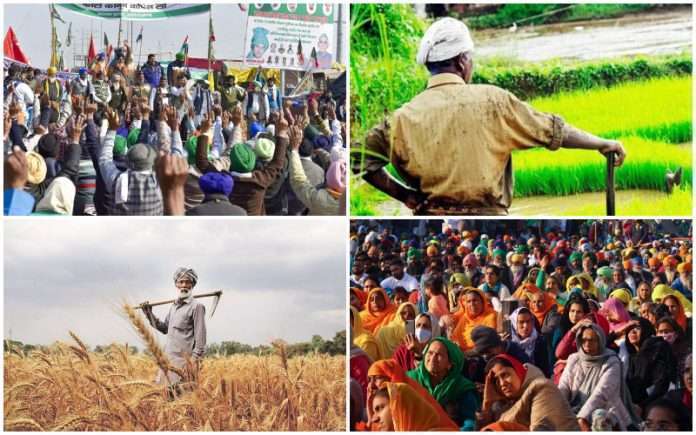As cold wave hits North India, the minimum temperature hovers around 5-6 degrees Celsius in New Delhi. The national capital has been in the news for farmers protest. As I write this, it’s almost 25 days since our farmers are on protest against the new agriculture laws.
Almost 41 farmers have died so far while protesting. Do you really understand the reasons behind the farmer’s protest? I think not. We tend to believe what is fed to us through the media. No, they are not terrorists, no, they are not just farmers from Punjab and Haryana that are protesting, farmers from all over the country are protesting, no they do not have a political reason for their protest, nor are they being supported by any political parties.
They are fighting for their own survival. Yes, the agriculture sector needed reforms but not in the manner the government is trying to shove changes down the throat of our farmers. Still not getting it?
Let me explain.
There are three or four major reasons for the protests. The first is, take for example you might be working in any industry or are an employee, you are ensured minimum wages, you get a salary, according to minimum wages act, and there is an appraisal each year too. In the same way ‘minimum support price’ was brought in to ensure whatever the farmers are growing will be brought at that minimum price. There was a guarantee for their produce.
Now in the new farm acts, there is no mention of this minimum support price. Although the government says this was never the law but was a policy decision, the farmers say make it law then if you are really thinking about our benefit.
The second reason is for APMC, the Sarkari mandis. There’s an assumption that these laws will eventually make APMC markets redundant. You need to understand why there is such an assumption. The transactions in APMC are taxed. The new acts say that the new transactions outside the APMC markets, the so-called freedom that it gives to the farmers of selling their produce to anyone, these transactions will not be taxed.
So, now when we look at what happened to our telecom sector, healthcare sector, and education sector or farming sector worldwide where private players were let in, they gave all types of incentives initially but later they gained monopoly, they dominated the whole market and then they controlled the market.
As an example please remember Uber, Amazon, or jio. First, they reduced their price and gained the confidence of the market, and then dominated it. The fear is that this is what might happen to the agriculture sector also due to privatization and monopolization. Slowly, the APMC markets will vanish systematically, because if private players give incentives to the farmers, they will sell their produce to them. And in the next 5-10-15 years, there will be a monopoly of the private players involved.
The third is contract farming, let me explain with examples. You eat Lays chips or Uncle Chips or chips from any other company, they are made of potatoes. Potatoes don’t grow in factories; they are grown by our Indian farmers. Yes, next time please do turn the chips packet and read the information. You will get to know where the company has its unit and got the potatoes from. That’s done under a contract with companies.
Contract farming is when a company signs a contract with farmers to sell their produce to them. So far so good. Now, you will find many examples of the misuse of the contract, you need to just Google it. Strengthening the contact farming, these new laws say that if there is a dispute between a farmer and a company and the corporate refuses to pay the decided price due to any given reason, then the farmer can only go up to the level SDM or DC with his dispute. They cannot approach the judiciary. Only people from small cities or towns can understand how big a threat it can become at the local level.
Now the fourth reason is, the Essential Commodities Act ensured that the government regulates the storage of food goods in case of war. More specifically, one cannot hoard food commodities. The new laws remove the limit of storage. So, when a private player enters, there will be no limit for storage because of the huge capital they have.
We all know basic economics, whoever controls the supply, also controls the price. The essential commodities in the market, the food that we eat, the private players will decide their price now. So, in the long run, we may have to pay higher prices for the food we eat. So, in a way, they are fighting for us too not just for themselves.
These are the major fears due to these new laws.
Yes, it’s understood that agriculture sector needs reforms, it was long overdue, but there is a trust issue from our farmers’ side. Can’t we quell their fears in a quite manner and not let them suffer in the bitter cold. They are the ones who bring food to our table, the least we can do is listen to them and not call them terrorists.
(The views expressed are the writer’s own)

Smita Singh is a freelance writer who has over 17 years of experience in the field of print media, publishing, and education. Having worked with newspapers like The Times of India (as a freelancer), National Mail, Dainik Bhaskar, and DB Post, she has also worked with Rupa& Co, a book publishing house, and edited over 30 books in all genres.
She has worked with magazines like Discover India and websites called HolidayIQ and Hikezee (now Go Road Trip). She has also written for Swagat (former in-flight magazine of Air India), Gatirang (magazine of MarutiUdyog), India Perspectives (magazine for Ministry of External Affairs) and Haute Wheels (magazine of Honda).
After turning freelance writer she wrote on art and architecture for India Art n Design. She also worked for Princeton Review as a full-time Admissions Editor and then IDP Education Private Limited as an Application Support Consultant. Smita has her own website called bookaholicanonymous.com which supports her love for books and reading!
You can reach her at: [email protected]
(Collage with images from the net)

